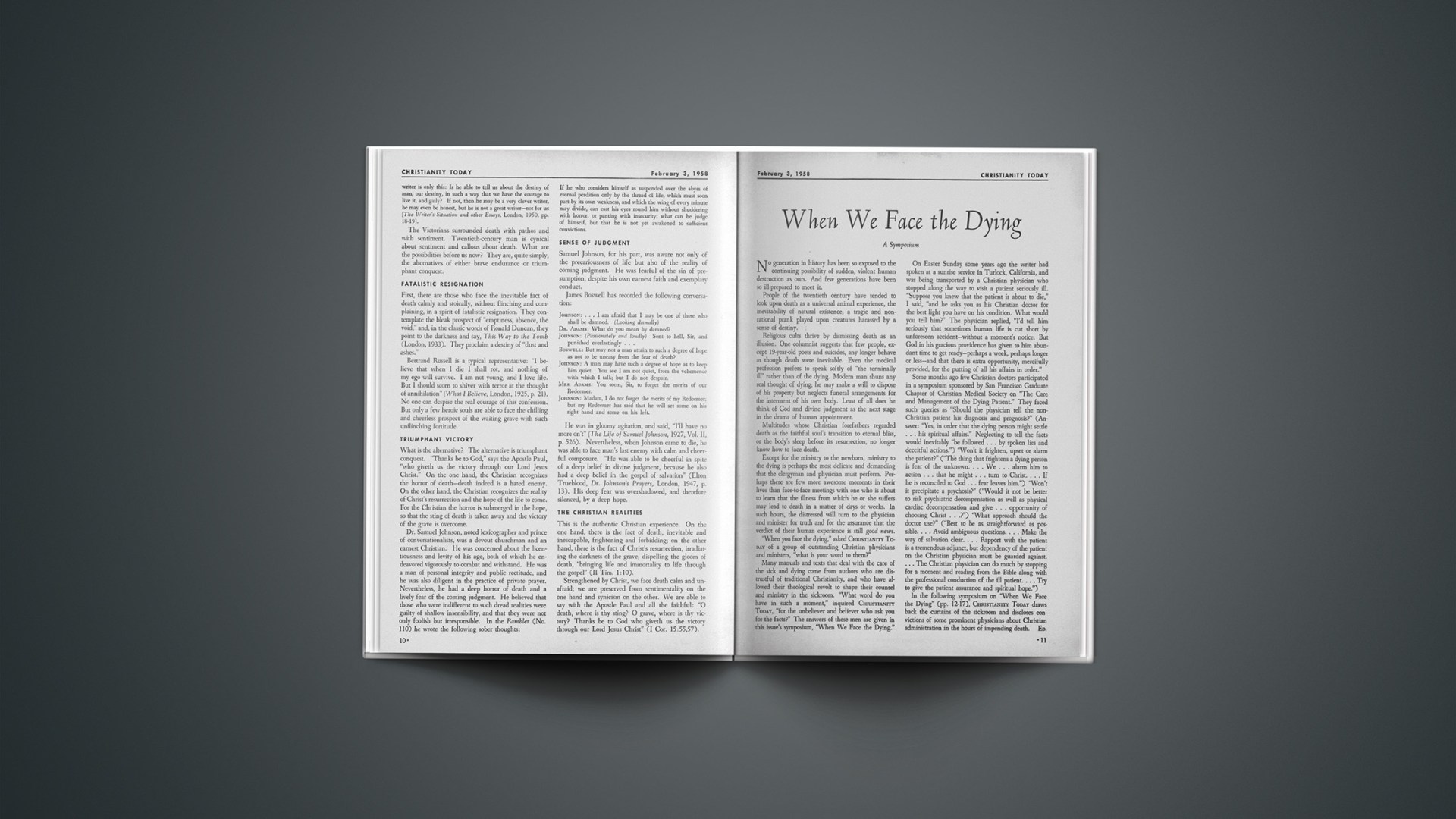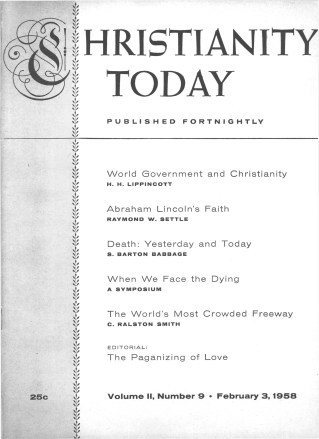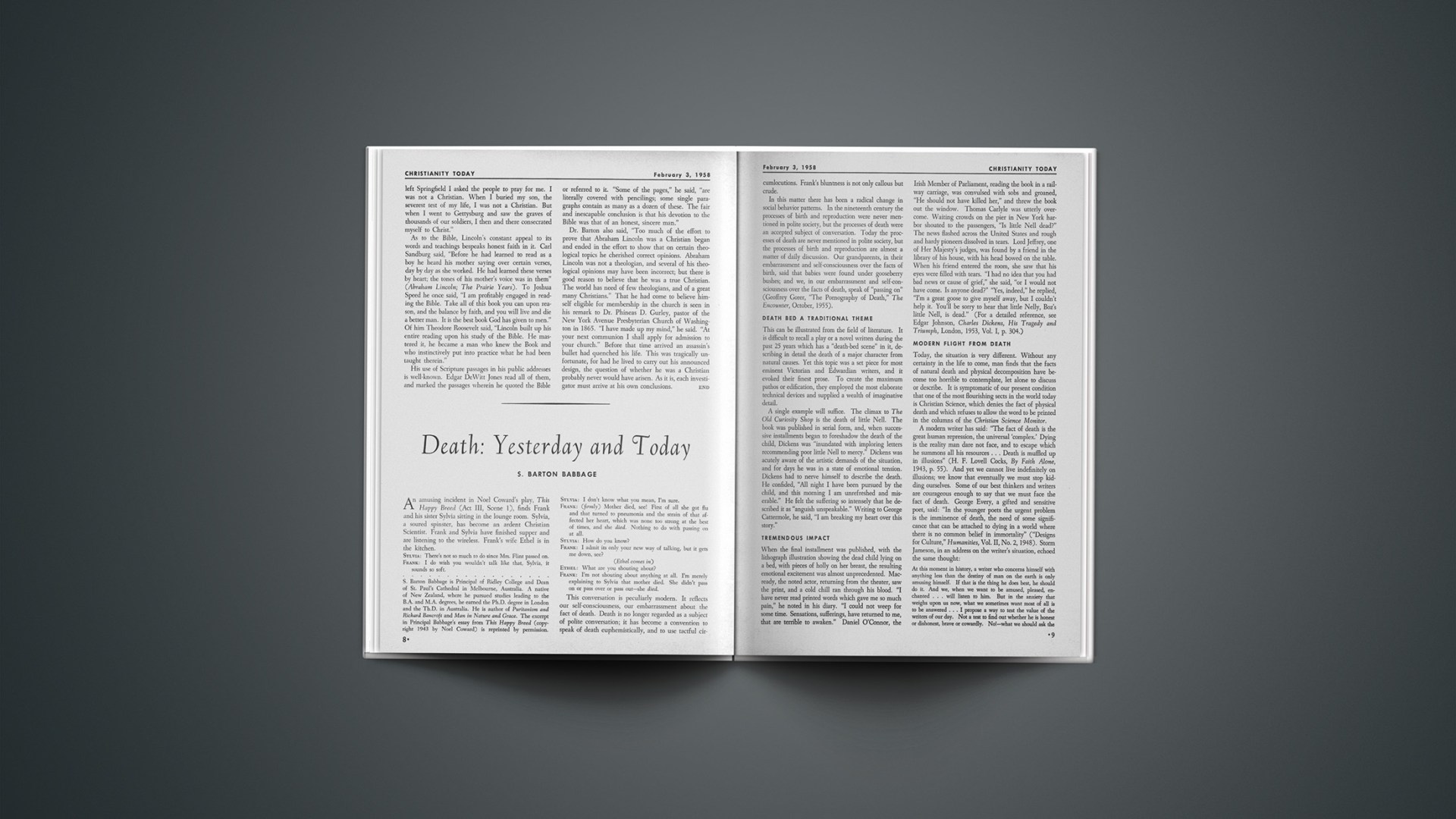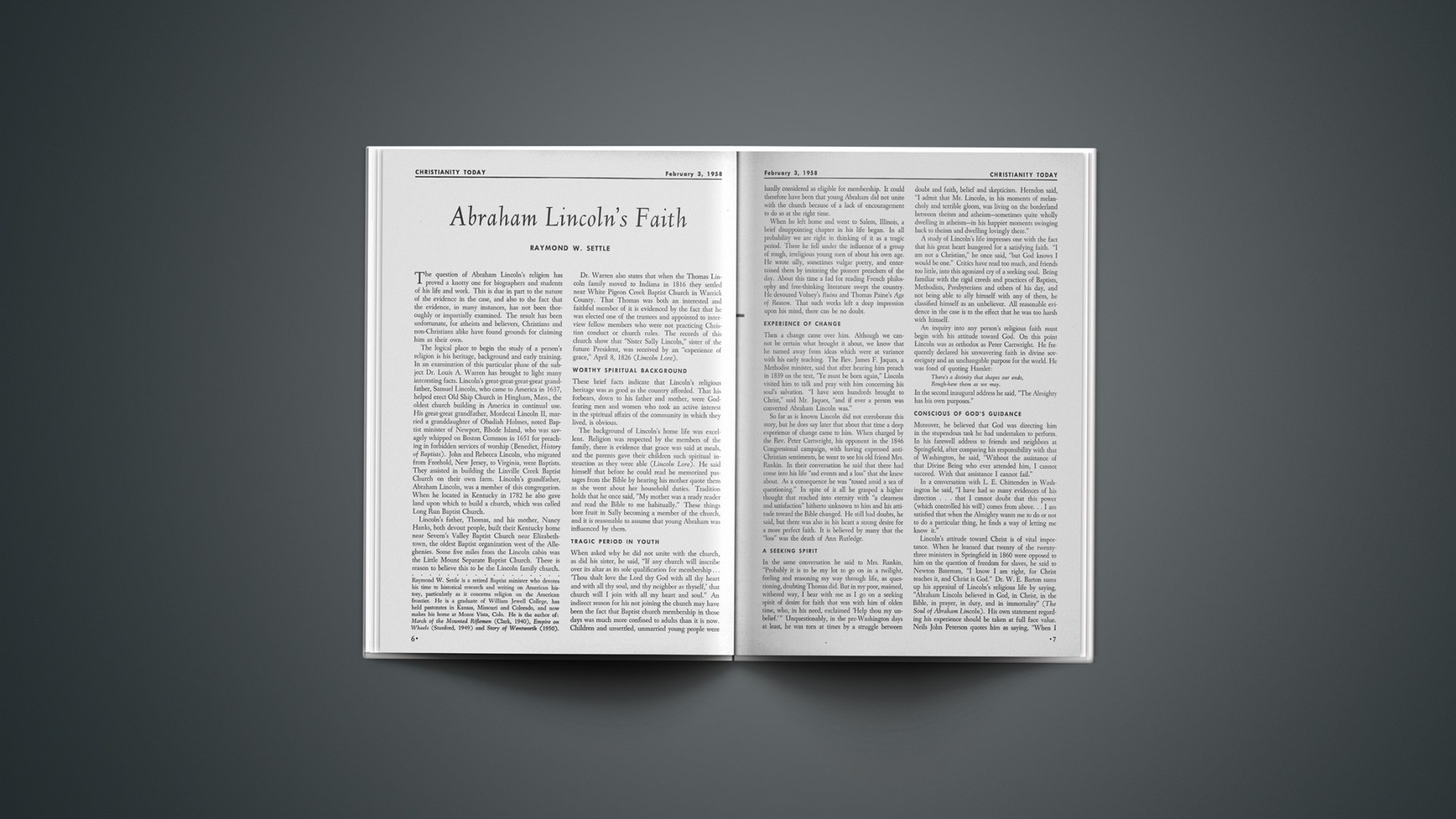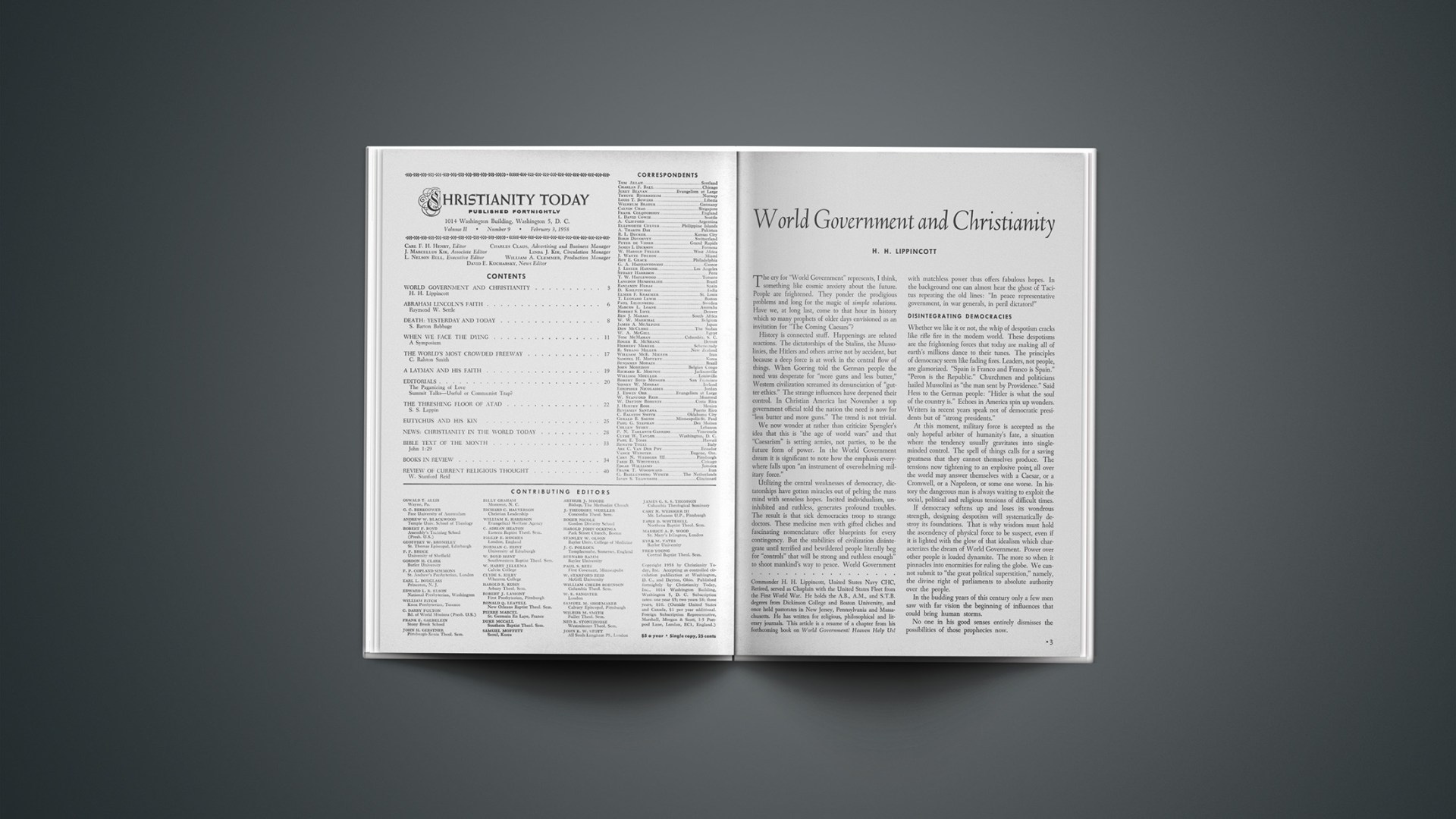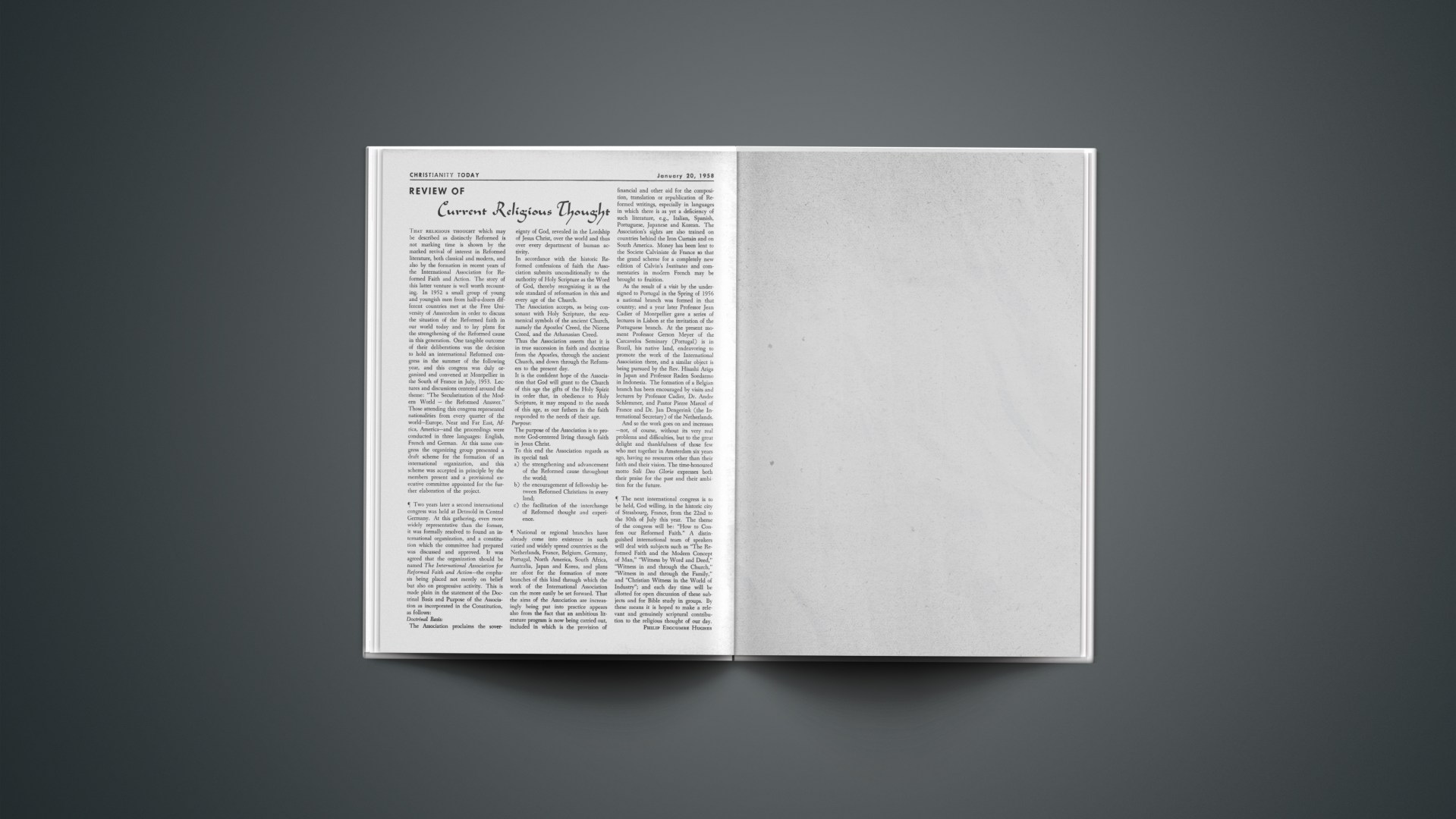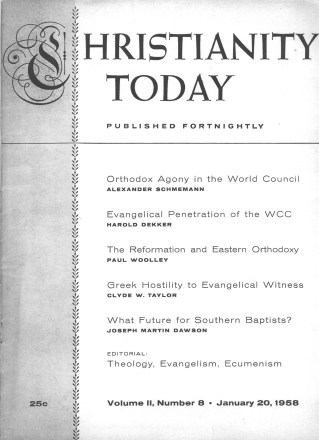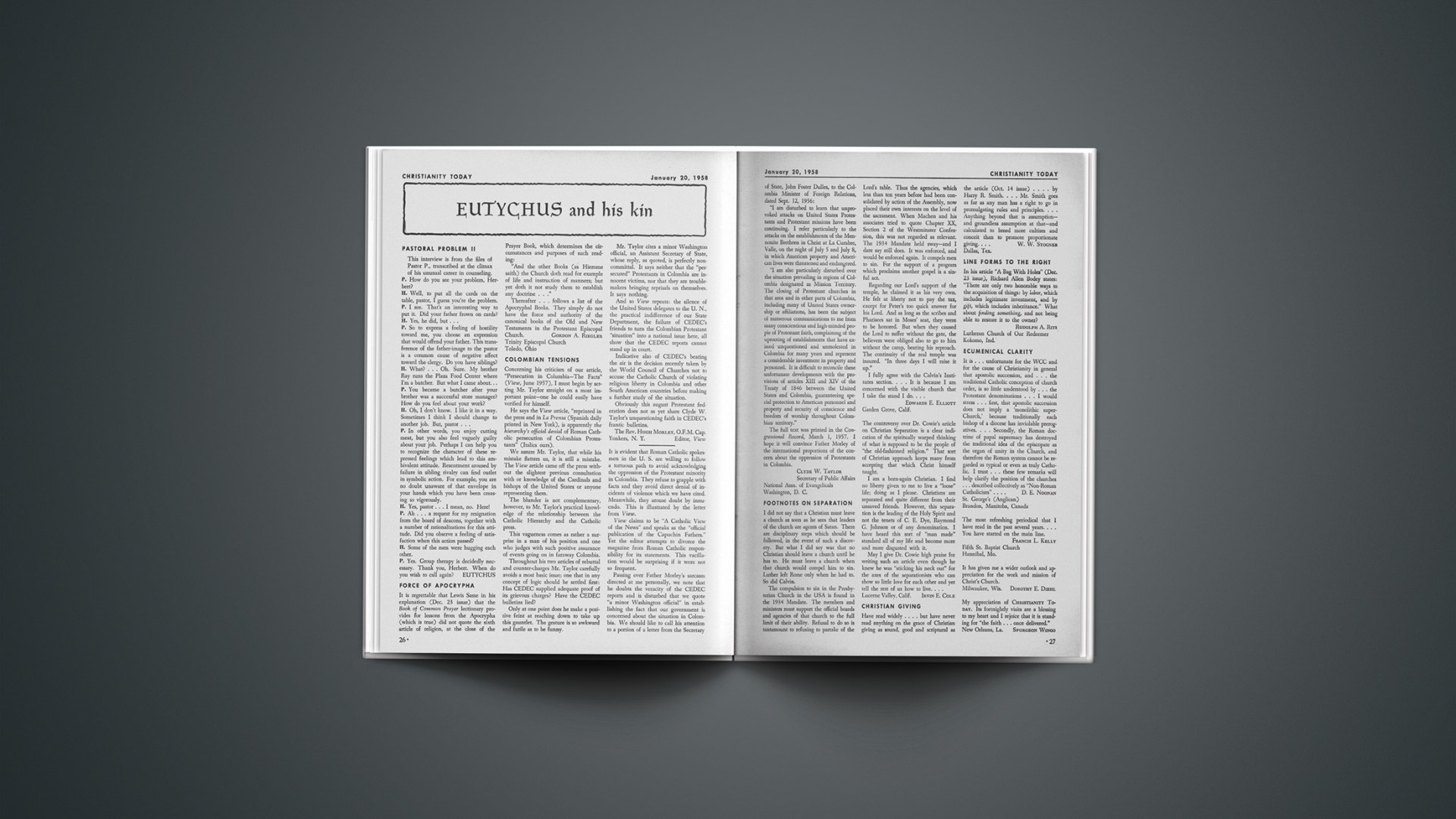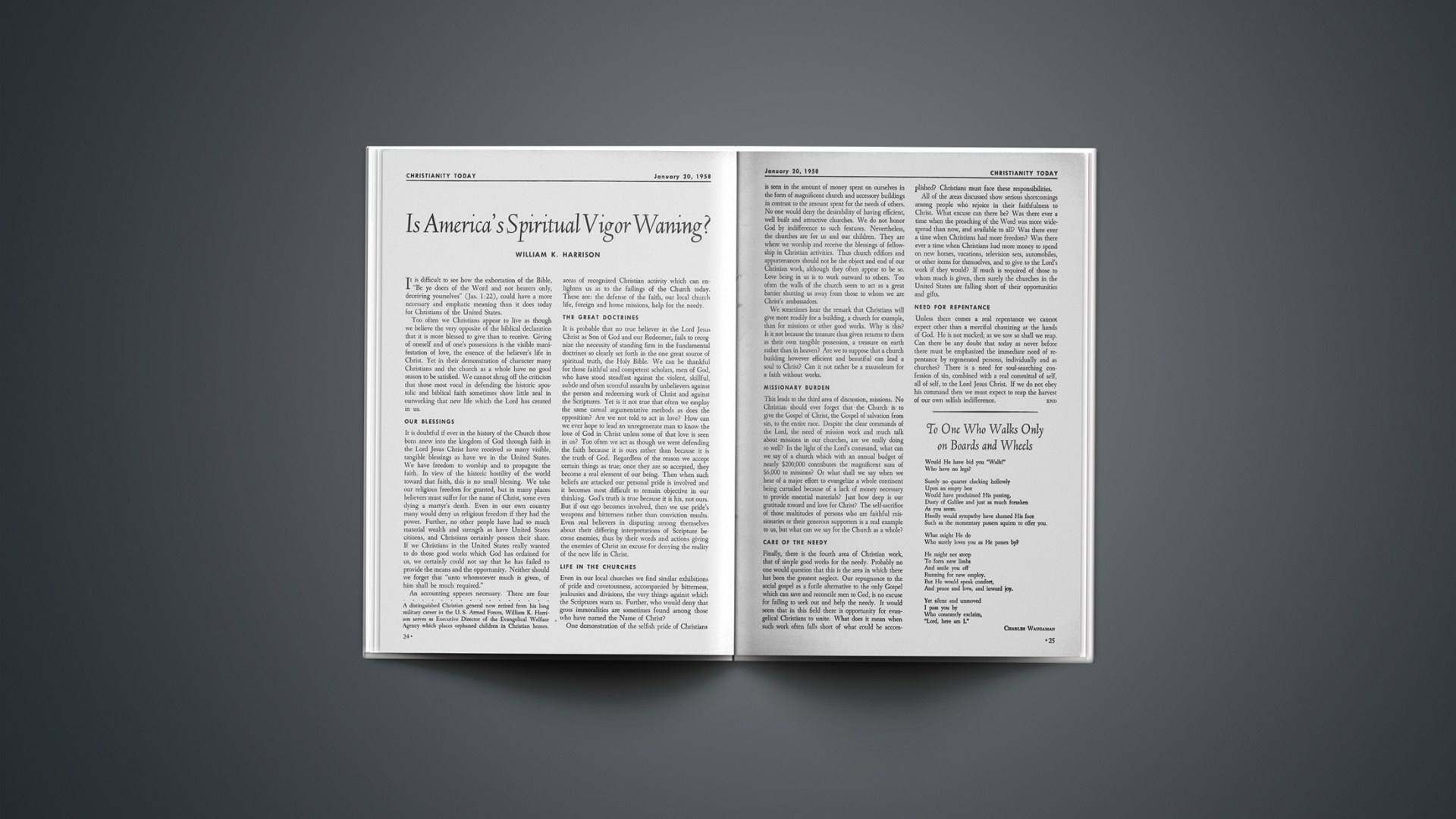A Symposium
No generation in history has been so exposed to the continuing possibility of sudden, violent human destruction as ours. And few generations have been so ill-prepared to meet it.
People of the twentieth century have tended to look upon death as a universal animal experience, the inevitability of natural existence, a tragic and non-rational prank played upon creatures harassed by a sense of destiny.
Religious cults thrive by dismissing death as an illusion. One columnist suggests that few people, except 19-year-old poets and suicides, any longer behave as though death were inevitable. Even the medical profession prefers to speak softly of “the terminally ill” rather than of the dying. Modern man shuns any real thought of dying; he may make a will to dispose of his property but neglects funeral arrangements for the interment of his own body. Least of all does he think of God and divine judgment as the next stage in the drama of human appointment.
Multitudes whose Christian forefathers regarded death as the faithful soul’s transition to eternal bliss, or the body’s sleep before its resurrection, no longer know how to face death.
Except for the ministry to the newborn, ministry to the dying is perhaps the most delicate and demanding that the clergyman and physician must perform. Perhaps there are few more awesome moments in their lives than face-to-face meetings with one who is about to learn that the illness from which he or she suffers may lead to death in a matter of days or weeks. In such hours, the distressed will turn to the physician and minister for truth and for the assurance that the verdict of their human experience is still good news.
“When you face the dying,” asked CHRISTIANITY TODAY of a group of outstanding Christian physicians and ministers, “what is your word to them?”
Many manuals and texts that deal with the care of the sick and dying come from authors who are distrustful of traditional Christianity, and who have allowed their theological revolt to shape their counsel and ministry in the sickroom. “What word do you have in such a moment,” inquired CHRISTIANITY TODAY, “for the unbeliever and believer who ask you for the facts?” The answers of these men are given in this issue’s symposium, “When We Face the Dying.”
On Easter Sunday some years ago the writer had spoken at a sunrise service in Turlock, California, and was being transported by a Christian physician who stopped along the way to visit a patient seriously ill. “Suppose you knew that the patient is about to die,” I said, “and he asks you as his Christian doctor for the best light you have on his condition. What would you tell him?” The physician replied, “I’d tell him seriously that sometimes human life is cut short by unforeseen accident—without a moment’s notice. But God in his gracious providence has given to him abundant time to get ready—perhaps a week, perhaps longer or less—and that there is extra opportunity, mercifully provided, for the putting of all his affairs in order.”
Some months ago five Christian doctors participated in a symposium sponsored by San Francisco Graduate Chapter of Christian Medical Society on “The Care and Management of the Dying Patient.” They faced such queries as “Should the physician tell the non-Christian patient his diagnosis and prognosis?” (Answer: “Yes, in order that the dying person might settle … his spiritual affairs.” Neglecting to tell the facts would inevitably “be followed … by spoken lies and deceitful actions.”) “Won’t it frighten, upset or alarm the patient?” (“The thing that frightens a dying person is fear of the unknown.… We … alarm him to action … that he might … turn to Christ.… If he is reconciled to God … fear leaves him.”) “Won’t it precipitate a psychosis?” (“Would it not be better to risk psychiatric decompensation as well as physical cardiac decompensation and give … opportunity of choosing Christ …?”) ‘What approach should the doctor use?” (“Best to be as straightforward as possible.… Avoid ambiguous questions.… Make the way of salvation clear.… Rapport with the patient is a tremendous adjunct, but dependency of the patient on the Christian physician must be guarded against.… The Christian physician can do much by stopping for a moment and reading from the Bible along with the professional conduction of the ill patient.… Try to give the patient assurance and spiritual hope.”)
In the following symposium on “When We Face the Dying” (pp. 12–17), CHRISTIANITY TODAY draws back the curtains of the sickroom and discloses convictions of some prominent physicians about Christian administration in the hours of impending death.
ED.
“a tremendous responsibility as a Christian to warn …”
The Christian doctor faces a major problem in speaking on spiritual matters to the dying patient. He must not force his message on the patient nor take advantage of the trust which is his as a physician. However, he has a tremendous responsibility as a Christian to warn the wicked man. Truly he must embrace God’s wisdom if he is to combine these responsibilities.
In my own case I start the day with an hour in prayer and the Bible. I put great emphasis on memorizing the Word. I pray that God will help me to recognize opportunities and not pass them over.
Openings may come in several ways. A Bible or Testament on the night stand may be one natural opening to talk about spiritual things. Or, I may greet a patient with a well-known quotation and follow it with a scripture verse. This frequently leads into an opportunity to open the Scriptures.
In giving God’s Word to a patient, I make it “plain Scripture.” That is, I let the Word speak for itself. It is the prayer of my heart that I might make the Gospel so plain that they can never stand before the judgment seat and say, “I did not hear.” I present the truths of the Bible quietly, without emotionalism, but with sincerity. Frequently this leads to an opportunity for me to share my testimony with them.
I can perhaps illustrate how this works. I was making the rounds one morning and noted that one of my patients, a 27-year-old mother of two children—dying with cancer—appeared very frightened. I delayed my rounds, sat on the side of her bed, and quietly quoted verse after verse to her from the Bible without comment. I continued for about an hour. Nearly halfway through I noted that the strained, fearful look in her face disappeared. When I finished she turned her head, looked me straight in the eye and said, “Thanks; that’s just what I needed. I’ve just taken Christ as my Saviour. Now I’m ready to die.”
“truth tempered with love … can raise morale …”
Early in my medical career, I was faced with having to make a decision as to management of a patient with an incurable disease, facing death. I was led at that time to follow a principle expressed in a phrase from Psalms, “I have chosen the way of truth.” This has been my basic pattern for handling all types of seriously ill patients.
Truth can be cold, and if presented in that way, it can have a devastating effect on a person’s morale. However, truth tempered with love and understanding can actually raise morale, and produce a cooperative patient who is not worried about facing some intangible unknown. The confidence of the patient in the doctor is increased, and a kindly explanation of the expected course of the disease, and the things which will be done for him medically, help to allay the fears that he may have. Scriptures, such as 2 Corinthians 5, are a tremendous help to the Christian.
The unbeliever presents to me the greatest challenge. He must be led to the understanding that not only does he face physical death, but that he is already dead spiritually, and that he must be born again before physical death. This combined problem calls for the utmost care in broaching the subject to the patient, and usually it is best introduced in response to questions that he will ask. In some cases, it may be better to have the cooperation of a minister, or another Christian, in a spiritual presentation and bringing the person to the crucial decision. In our hospital we have had invaluable assistance from our nurses in this regard.
As the years have gone by, my only regrets are the instances in which I have deviated from the above course because of pressure from relatives, or lack of faithfulness on my part.
“God’s will does not always correspond with ours …”
In dealing with parents who give little evidence of any understanding of spiritual things, my approach is to portray for them the medical situation of their child and point out the all-embracing nature of God’s love for children. This gives me a general basis for pointing out that even mortal illness must fall within the confines of God’s love because God loved humanity enough to sacrifice his only Son, the Lord Jesus Christ, for its salvation. Since most of my patients who are seriously ill fall in the group under five years of age, I believe that I can hold out scriptural reasons why the child may go to spend eternity with the Lord because they have not reached the so-called age of accountability. This gives me the opportunity to challenge the parents themselves with the claims of Jesus Christ. because they have had the opportunity to make an individual choice in the matter.
Certainly, it is always much easier to talk to those who know the Saviour because they are reassured that God’s will is being worked out for their child. Often they need to understand that God’s will does not always correspond with our will and therefore does not mean that the child will necessarily get well. However, we can express the same confidence that the child will go to be with our Heavenly Father if it has not reached the age of personal decision. As comfort to the parents I often quote the Apostle Paul who said that he wished to be “with Christ, which is far better.” So we, as believers, cannot wish to withhold from our loved ones this same rich inheritance.
I do not always get the opportunity to speak with parents in such direct fashion before their child’s death, so I make it a rule to write a word of sympathy and compassion to them several weeks after the child’s passing. In this I again express the thought of God’s love as seen in Calvary.
“were I faced with this … my resource is God …”
For more than a decade, my practice has been confined to the surgical problems of infancy and childhood. This means that I usually have two parents and occasionally a grandparent or two as a captive audience when it becomes necessary to talk about the imminent death of a child.
If I know the parents to be unbelieving, or am uncertain of their position, I could not stand up emotionally under the repeated necessity of breaking such news to them if I doubted for one moment the sovereignty of God. From that position, unless the door for further talk is completely closed, I proceed to narrow the discussion to the Lord Jesus Christ and my own dependence upon him for salvation and daily guidance. Then I confess that were I faced with the problem of a dying child, my only resource would be to him for understanding and strength. If possible, I pray with such people, reiterating the Gospel, my own stand, and praying for strength for them.
It should be stated that in all my dealings with parents I attempt to be forthright, explaining the surgical problem at hand in the simplest of language and in the most authoritative fashion. When discussing the spiritual side of the situation, I maintain the same positive approach and speak with assurance.
When dealing with people I know to be Christian, trusting the Lord, and walking with him, I recall to them the promise, “To be absent from the body is to be present with the Lord.” From there, I proceed to a reaffirmation of our hope in eternal life, reunion with believers, and the reality of 1 Peter 5:7.
If the question of “faith-healing” is brought up, I make it a point never to pray for medical miracles but rather ask, “Thy will be done.” I attempt to place absolutely no emphasis on “faith-healing” of the 1957 popular variety. I affirm my belief in the Lord’s complete ability to do anything, but it is apparent that it is his intent not to perform miracles in reference to certain medical problems in this age.
“only a few patients want to know the hard facts …”
The patient usually comes to the physician, whether he be Christian or non-Christian, for professional advice. To interject, unsolicited by the patient, one’s personal religious beliefs into this professional relationship is unethical. As a Christian, I must support this position or alternatively grant to physicians of every religious conviction freedom to exploit the professional situation for proselyting.
Prognosis by the physician of the outcome of an illness is not as accurate as either he or the patient would like it to be, nor is it as accurate as he might like the patient to believe it to be. Only those physicians who have had wide experience know how fallible a prognosis, given in good faith, can be. The physician assumes certain liabilities and then justifiably seeks to protect himself by providing some latitude.
It is my opinion that only a few patients want to know the hard facts if they are suspicious their illness may be fatal. The physician must try to understand what the patient is really saying by the words he uses. For example, the cancer patient may say, “This isn’t something serious from which I could die, is it, Doctor?” This patient probably is seeking reassurance rather than facts.
A physician has no more difficulty than any other person in conveying by his personal life the nature of his religious beliefs. He can, by his compassion, and by his efforts to lead a Christlike life, invite the confidence of his patient who may then seek spiritual advice from him as well as professional. When requested by word or any other valid form of human expression, he may speak to a believing or unbelieving patient of his own faith in God, confident in the rightness of his judgments and the wideness of his mercy.
I have not tried to evade the question, “What word do you have in such a moment?” But the situation is not simple—it is extremely complex. What one says (or does) depends on how much he understands of the situation—emotionally and intellectually as well as spiritually. There are no special words that physicians—or ministers—can use routinely. Each must be carefully selected to meet the needs of the individual patient faced with what to him is a completely unique situation. Ministers must, I believe, give careful study to the special problems of the sick and the dying if their ministry to them is to be spiritually effective.
“apart from the Christ, only narcotics and sympathy …”
The patient who is “sick unto death” becomes a person very important and extremely individual. Not many are called upon to face this time with absolute knowledge of the impending mortal finality. Fatigue, unconsciousness, or sudden physiological crisis carries one into eternity without warning.
This is a time that is real proof of therapy. Apart from the dynamic message of Christ, a physician can offer only narcotics and sympathy.
The words of our Master, “Let not your heart be troubled, ye believe in God, believe also in me. In my Father’s house are many mansions, if it were not so, I would have told you. I go to prepare a place for you”—these are to the seeking unbeliever a specific drug that will remove the turmoil of doubt and set the mind at ease. What peace! They are to the believer a soothing balm.
There will be those to whom we cannot speak. These must see Christ in us and feel his presence by our gentleness, understanding and sympathy.
“the sovereignty of God … is a great comfort …”
I have never been called on for spiritual facts by an unbeliever who knew he was dying, nor have I had to break the news of imminent death to any unbeliever. But I have been asked by relatives of a dying unbeliever to visit him and to bear witness. Let me use one particular illustration.
A devout Christian who listened to me on the radio but was not a member of Park Street Church called me and asked me if I would go visit her husband who had had a serious heart attack and was expected to die. He did subsequently die within ten days or two weeks. My approach to him was to appeal to his knowledge of the Christian testimony of his faithful wife. This he freely admitted and confessed. Next, I asked if he knew where he was going. With his indefinite response I then pressed the issue as to whether he did not want to know where he was going. A reluctant “yes” was given and I thereupon expounded the Gospel in its three main points: First, that all men are sinners according to the Scripture. I used Isaiah 53:6; Romans 3:10, 23, and other passages. He freely admitted that he was a sinner. Second, I proclaimed the biblical truth that Christ died for sinners, according to Romans 3:24–26; 5:8; 1 Peter 2:21–24; 3:18, and so forth. Last, I pointed out to him that whosoever will call upon the name of the Lord shall be saved, for God is no respector of persons. With this I joined appeal to the thief who at the last moment called upon the Lord and was saved. This man responded affirmatively, prayed his prayer of confession, repentance and faith, after the form of prayer which I gave to him and became a Christian. He died in the faith. The sequel to it was that almost immediately after this his widow united with Park Street Church and is a member there today.
When I am requested to bring comfort to a believer who is facing the fact of death, I open the conversation by drawing the person to a statement of his own awareness of the imminence of death, then I turn his attention to the plan and purpose of God for our lives with such Scripture as, “It is appointed to man to die,” and “There is a time to be born and a time to die,” and that all of our times are in God’s hands. The emphasis upon the sovereignty of God as displayed in so many Scripture references is a comfort to a believer. A reiteration of the fact that God has a plan for every life and that one life is not to be compared to another is very helpful.
Next, I attempt to ascertain whether the believer is ready to go, pointing out the magnificent teachings of Scripture about the joys, privileges, blessings and rewards of being “with Christ” (Phil. 1:21–23; 2 Cor. 5:6–9). Next, I make a point to talk about heaven, the biblical description of heaven and of the loved ones who have gone on before. Always, of course, I conclude with prayer, often quoting from the parable of the pounds, or the talents, and of the necessity to stand before the judgment seat of Christ with the possibility of hearing well done, good and faithful servant.
Of course, there is no form which I use and everything is extemporaneous and applied to the particular incident. Thus, I cannot be too definite about details.
“we trust the goodness and mercy of God …”
It seems to me that perhaps the most important thing for a minister to manifest in the presence of a dying person is his own quiet sympathy, his personal (as against merely official) concern for the family, his assumption of faith in God and in everlasting life, and a few simple words to express this faith rather than a disquisition upon it. People do not need expositions at such a time, but simple expressions of faith, quietly and modestly expressed. Here, if ever, what we are and really believe speaks so loudly that people cannot hear what we say.
As to ministering to the dying person, let us be in constant prayer before and as we come into the room. There is no approved course of action. Let us be sensitive to any moment of consciousness and say to the dying only short, simple things that express our concern, or our faith that he or she is in God’s good hands. I seldom refer to death itself. If the individual is conscious and asks, “Am I going?” let us say something like, “It looks so. Let us have no fear. God is here. Let me commend you again to him,” and then a very brief prayer and benediction. If the person is conscious, of course, a brief service of Holy Communion, or giving the consecrated elements if they have been reserved, will bring the greatest comfort, if it be part of his tradition; the familiarity of the words and acts requires little effort of attention, and the knowledge that God is reaching out through the sacrament is strength and comfort to that one. If the person be alone without family, he may want to feel the touch of our hand on his, so that we meet the occasion with him as fully as we can. If there be fear, pray it quietly and positively away, asking God’s presence and forgiving love. One has the sense that our own real feelings are what matter most: they will express themselves in touch, in words and in the radiation of quiet faith. Let us avoid officiousness, or too much talk. Now and then someone will ask a real question about the hereafter: let us not fear to say what we believe and why, but not so much long arguments as the reasoned steps in belief and the positive elements of our faith in Christ and in everlasting life. How often do I quote, “Because I live, ye shall live also.”
If the dying person has ignored God consistently, and shows fear, let us speak freely of God’s forgiveness offered to honest souls, even at the last minute (witness the thief on the cross); and in any situation where God’s justice and mercy seem in conflict, the verse in Genesis is a help, “Shall not the Judge of all the earth do right?” (Gen. 18:25). Do not be afraid to say no man understands all these things: we trust the goodness and mercy of God. If we really believe in him this way ourselves, it will get over by contagion much more than by argument.
“an enemy whose power has been overthrown …”
One’s ministry to the dying seems to me to depend in its approach on whether the patient knows his true condition or not.
In the case of unbelievers, I believe it would be right to desire their enlightenment, but probably one should only do so in cooperation with the doctor and the family. I would seek an opportunity to unfold the way of salvation in the Gospel. If the patient is very ill, I would be content to keep to the simplicities of a Scripture like John 3:16; 6:37, or Matthew 11:28, or 1 Timothy 1:15. In order to bring into the patient’s consciousness what his true position before God is, I have sometimes asked him to imagine that we were standing before God’s judgment throne, and that he were to ask us in what we are trusting for our belief that he will welcome us into his presence in heaven. The patient’s answer nearly always reveals clearly whether he is trusting in himself and his own works or in Christ and his finished work. If the patient accepts Christ, I would seek to bring him into a restful assurance of salvation. I would also seek to remember his family who are themselves in need of help at this time. If he or they ask “why?” concerning this trial, I would not try to argue about the problem of suffering, but point them to the cross as the proof and pledge of God’s love.
If the patient is a believer, I would probably enquire gently if he has made all necessary practical preparations for his death as a Christian should, whether he has made his will and adequately provided for his family, for instance.
If he knows that he is dying, and is not surrendered to this possibility, I would take him to some such verse as Psalm 18:30, “As for God, his way is perfect,” and seek to lead him into a position of repose in the will of God. I would also remind him of the death and resurrection of Jesus through whom death had been “abolished” (Heb. 2:14; 2 Tim. 1:10). I would remind him that in the New Testament death is likened to an insect whose sting has been drawn and to an enemy whose power has been overthrown (1 Cor. 15:55). Passages of Scripture which I might read to him include Psalm 23; John 14:1–6; Romans 5:1–11 and 8:31–39; 2 Corinthians 5:1–9; Philippians 1:22–23; 1 Thessalonians 4:13–18 and 5:8–11; 2 Timothy 4:6–8; Hebrews 2:14–18; and Revelation 1:13–18.
“this is a current fad … to conceal the truth”
In a ministry of 20 years I have not had many opportunities to face a death sentence with people. Fads of the day pressurize people to conform. As there are fads in fashions, the arts, automobiles, politics, sports and amusements, so there are fads in religion and medicine. The current fad about incurable disease is to conceal the truth. Most of the time ministers are bound by the conspiracy of silence, evasion or downright falsehood. The old idea of helping to prepare the patient for death and destiny is hardly even entertained. The current slogan is: “Drug them into eternity.”
Fear of death is completely pagan. To brush aside fear and to look the probable outcome squarely in the eye is Christian.
I honor doctors, nurses, families, and patients who have chosen not to play the game of deceit and who have frankly accepted diagnosis though seemingly fatal. In these situations which I think have almost always concerned Christians I have been led to dwell on four themes:
1. God may yet give healing.
2. All suffering is controlled for God’s glory and our good.
3. The promises of Christ for life, death, and eternity hold true.
4. Heaven is a glorious place of rest and fellowship where those who have departed to be with Christ await the resurrection and its crowning events.
Two hymns have been especially comforting to quote, “O Love That Will Not Let Me Go,” and “Just As I Am.”
Where I have talked with patients whose experience of salvation seemed doubtful I have centered on the love of Jesus and his forgiveness. If I felt awkward about putting this into conversation I have put it into prayer. Sometimes I have prayed close to the ear of patients who were in coma, trusting God’s Spirit to apply truth at the gate of death.
“the sentences of hope took on new meaning”
We were on the Normandy beaches in June, 1944, during the invasion of Europe. A heavy shell had just landed, and the doctor and I were kneeling beside young soldiers wounded by the explosion. When we had lifted a young corporal onto a stretcher and into an ambulance, the doctor turned quietly to me and said, “Padre, that boy is severely wounded in the spine. He is conscious, and in no very great pain, but he cannot live more than a day or two. It could even be a matter of hours. I think it would be good if you went with him to the tent hospital.” I remember reading to Charlie, the young corporal, from John 14:1–6, and I have used this passage constantly.
1. It starts with the human problem of an anxious heart, and Jesus with all his human sympathy says, “Let not your heart be troubled.”
2. It draws upon the feeble general belief in God, which most men have, and it seeks to fan that belief into a true saving faith. “Ye believe in God, believe also in me.” We lead the seeker, in the extremity of his illness, to repentance from his sin, and a personal saving faith in Jesus Christ. Here I taught Charlie to say after me: “It’s trusting Jesus, and trusting him all the way.” This he said slowly and haltingly after me, as we lurched along the bombed roads of Normandy to the little cluster of brown tents just established inland from the heavily shelled beach area near Caen, where I was working.
3. “My Father’s house” and the certainty of heaven for all who trust in Christ comes in verses 2 and 3, with the promise that Christ Jesus will receive us to be with him. Heaven is seen as the home of Jesus, prepared by him for us, and is able to be understood by a sick man whose mental grasp may be slowed down by his serious illness, and who needs truth given him simply and clearly.
4. The question “How can we know?” (v. 5) is answered by the total provision of Christ as way, truth and life, with his exclusive claim that we can only come to God through Christ.
Slowly I showed this to Charlie, and got him to repeat again, “It’s trusting Jesus, and trusting him allthe way.” I wrote John 14:6 on a card in capital letters for him to have by his hospital bed.
When people are dying I concentrate on the fact of Christ’s Cross and Resurrection, with this emphasis: 1. Jesus loves you, because he died for you (Rom. 5:8). 2. Jesus bore your sins (1 Pet. 3:18). 3. Jesus rose again, to be a living Saviour, and so can be your friend now, and the Lord of life who gives you eternal life now, and so a welcome to heaven when God calls you. I concentrate, secondly, on the steps to Christ, such as Mark 1:15–17 (“Repent … Believe … Come”) and leave them with my small booklet, “How Can I Accept Christ,” and help them to take the decisive step of committal to Christ.
Each day I visited Charlie and he would say with me, “It’s trusting Jesus, and trusting him all the way.” On Sunday he was very close to death, but still conscious; and I can remember him saying, “I’ve been saying my prayers today, Padre,” and we talked again about John 14:6 and “trusting Jesus all the way.” Later that day he died, as I believe, in the faith of Christ, and I and the peasant people near the hospital tents brought red roses for his simple funeral under the blue Normandy sky with the white vapour trails crossing and recrossing far above us. The great sentences of hope took on a new meaning as I remembered Charlie slowly finding his way to the Lord Jesus in the last days of his young life.
“I am the resurrection and the life,” saith the Lord. “He that believeth in me, though he were dead, yet shall he live” (John 11:25).

